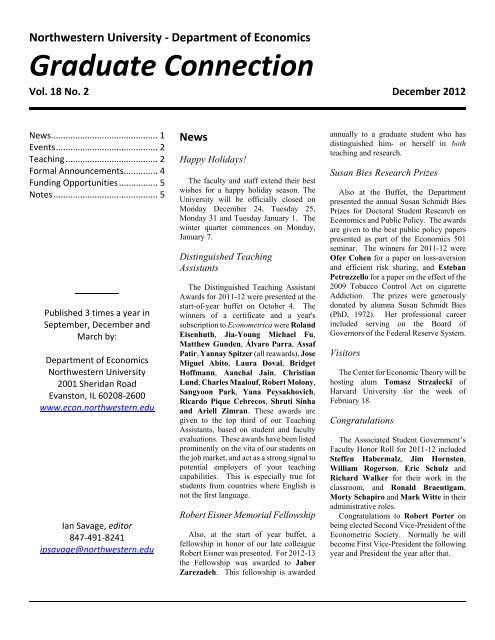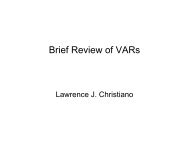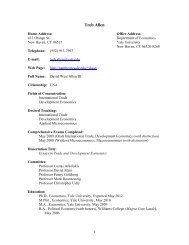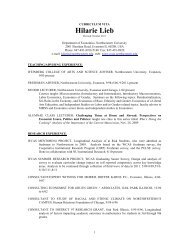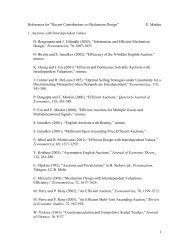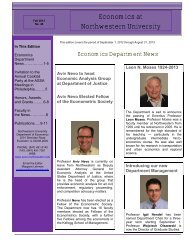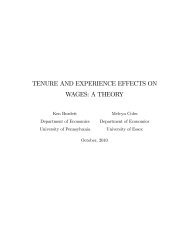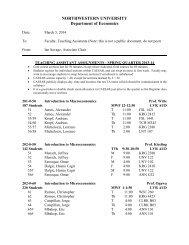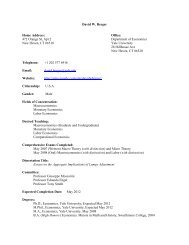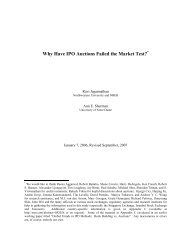Graduate Connection - Northwestern University
Graduate Connection - Northwestern University
Graduate Connection - Northwestern University
You also want an ePaper? Increase the reach of your titles
YUMPU automatically turns print PDFs into web optimized ePapers that Google loves.
<strong>Northwestern</strong> <strong>University</strong> ‐ Department of Economics<br />
<strong>Graduate</strong> <strong>Connection</strong><br />
Vol. 18 No. 2 December 2012<br />
News............................................ 1<br />
Events .......................................... 2<br />
Teaching ...................................... 2<br />
Formal Announcements.............. 4<br />
Funding Opportunities ................ 5<br />
Notes ........................................... 5<br />
_________<br />
Published 3 times a year in<br />
September, December and<br />
March by:<br />
Department of Economics<br />
<strong>Northwestern</strong> <strong>University</strong><br />
2001 Sheridan Road<br />
Evanston, IL 60208‐2600<br />
www.econ.northwestern.edu<br />
Ian Savage, editor<br />
847‐491‐8241<br />
ipsavage@northwestern.edu<br />
News<br />
Happy Holidays!<br />
The faculty and staff extend their best<br />
wishes for a happy holiday season. The<br />
<strong>University</strong> will be officially closed on<br />
Monday December 24, Tuesday 25,<br />
Monday 31 and Tuesday January 1. The<br />
winter quarter commences on Monday,<br />
January 7.<br />
Distinguished Teaching<br />
Assistants<br />
The Distinguished Teaching Assistant<br />
Awards for 2011-12 were presented at the<br />
start-of-year buffet on October 4. The<br />
winners of a certificate and a year's<br />
subscription to Econometrica were Roland<br />
Eisenhuth, Jia-Young Michael Fu,<br />
Matthew Gunden, Álvaro Parra, Assaf<br />
Patir, Yannay Spitzer (all reawards), Jose<br />
Miguel Abito, Laura Doval, Bridget<br />
Hoffmann, Aanchal Jain, Christian<br />
Lund, Charles Maalouf, Robert Molony,<br />
Sangyoon Park, Yana Peysakhovich,<br />
Ricardo Pique Cebrecos, Shruti Sinha<br />
and Ariell Zimran. These awards are<br />
given to the top third of our Teaching<br />
Assistants, based on student and faculty<br />
evaluations. These awards have been listed<br />
prominently on the vita of our students on<br />
the job market, and act as a strong signal to<br />
potential employers of your teaching<br />
capabilities. This is especially true for<br />
students from countries where English is<br />
not the first language.<br />
Robert Eisner Memorial Fellowship<br />
Also, at the start of year buffet, a<br />
fellowship in honor of our late colleague<br />
Robert Eisner was presented. For 2012-13<br />
the Fellowship was awarded to Jaber<br />
Zarezadeh. This fellowship is awarded<br />
annually to a graduate student who has<br />
distinguished him- or herself in both<br />
teaching and research.<br />
Susan Bies Research Prizes<br />
Also at the Buffet, the Department<br />
presented the annual Susan Schmidt Bies<br />
Prizes for Doctoral Student Research on<br />
Economics and Public Policy. The awards<br />
are given to the best public policy papers<br />
presented as part of the Economics 501<br />
seminar. The winners for 2011-12 were<br />
Ofer Cohen for a paper on loss-aversion<br />
and efficient risk sharing, and Esteban<br />
Petruzzello for a paper on the effect of the<br />
2009 Tobacco Control Act on cigarette<br />
Addiction. The prizes were generously<br />
donated by alumna Susan Schmidt Bies<br />
(PhD, 1972). Her professional career<br />
included serving on the Board of<br />
Governors of the Federal Reserve System.<br />
Visitors<br />
The Center for Economic Theory will be<br />
hosting alum Tomasz Strzalecki of<br />
Harvard <strong>University</strong> for the week of<br />
February 18.<br />
Congratulations<br />
The Associated Student Government’s<br />
Faculty Honor Roll for 2011-12 included<br />
Steffen Habermalz, Jim Hornsten,<br />
William Rogerson, Eric Schulz and<br />
Richard Walker for their work in the<br />
classroom, and Ronald Braeutigam,<br />
Morty Schapiro and Mark Witte in their<br />
administrative roles.<br />
Congratulations to Robert Porter on<br />
being elected Second Vice-President of the<br />
Econometric Society. Normally he will<br />
become First Vice-President the following<br />
year and President the year after that.
December 2012 <strong>Graduate</strong> <strong>Connection</strong> • 2<br />
NU wins Fed College Challenge<br />
<strong>Northwestern</strong> <strong>University</strong> won the<br />
national finals of the College Fed<br />
Challenge on November 27, a competition<br />
that encourages students to learn about the<br />
U.S. economy, monetary policymaking,<br />
and the role of the Federal Reserve System.<br />
The team included undergraduates<br />
Geoffrey Bery, Nikhil Byanna, David<br />
Chen, Jonathan Cohen, Eric Zhang, and<br />
faculty adviser Mark Witte. <strong>Northwestern</strong><br />
has now won the title four times out of the<br />
nine times it has been contested.<br />
Events<br />
AEA Annual Meeting<br />
The annual meetings of the American<br />
Economics Association will be held in San<br />
Diego on Friday to Sunday, January 4-6. If<br />
you are at the conference, stop by the NU<br />
annual cocktail party in the “Windsor<br />
B&C” room of the Manchester Grand<br />
Hyatt from 6-8pm on the Saturday.<br />
There will also be a special session on<br />
Friday afternoon and a reception in the<br />
evening honoring late faculty member<br />
Marcus Alexis. Details are on the main<br />
page of our web site.<br />
Martin L. King, Jr. Day<br />
On Monday, January 21, all classes are<br />
canceled in observance of Dr. Martin<br />
Luther King Jr. Day. There will be no<br />
undergraduate or graduate classes. It is<br />
also inappropriate to hold discussion<br />
sections or office hours.<br />
While classes are canceled, the<br />
university will not be closed for the day.<br />
Departmental and other university<br />
administrative offices will be open. There<br />
will be numerous events held on campus to<br />
celebrate the life and legacy of Dr. King.<br />
Mark Your Calendars<br />
Mark your calendars for these special<br />
events in the Spring Quarter. Full details<br />
will be given in the March <strong>Graduate</strong><br />
<strong>Connection</strong>.<br />
April 4 (Thursday): Prospective<br />
graduate student open day<br />
April 11 (Thursday): Susan Bies Annual<br />
Lecture on Economic Policy featuring<br />
Esther Duflo of MIT<br />
May 15 (Wednesday): Nemmers Prize<br />
lecture by Daron Acemoglu of MIT<br />
May 16-17 (Thursday-Friday):<br />
Nemmers Prize conference<br />
May 22 (Wednesday): Nancy L.<br />
Schwartz Memorial Lecture featuring Hal<br />
Varian, chief economist at Google<br />
Teaching<br />
Seminar Registrations<br />
The Department has updated the 500level<br />
seminar offerings. One implication is<br />
that we will not be offering Econ 501 and<br />
the 500-level workshop classes in the<br />
Winter Quarter when these classes usually<br />
do not meet. They will return in the Spring<br />
Quarter. Students who need to register for<br />
additional credits to maintain full-time<br />
status should use Econ 590 (for second<br />
year students) and TGS 500 (for older<br />
students).<br />
This Quarter’s Course Descriptions<br />
The Department has a policy to avoid<br />
the problem of excessive awarding of<br />
incomplete grades. Please see our web site<br />
for a complete statement. Report any<br />
problems to the Director of <strong>Graduate</strong><br />
Studies.<br />
Economics 412-2<br />
Economy Theory and Methods<br />
Professor Olszewski<br />
MW 1:30-3:30 Jacobs 3204<br />
The course will comprise some topics<br />
from the frontier of research in economic<br />
theory. The material will typically be more<br />
advanced than Game Theory, by Drew<br />
Fudenberg and Jean Tirole (MIT Press,<br />
1991).<br />
The topics will be selected - jointly with<br />
students - from the following list: (1) cheap<br />
talk; (2) herd behavior, reputational and<br />
informational cascades; (3) classic models<br />
of repeated games; (4) repeated games with<br />
private monitoring, continuous time, and<br />
incomplete information; (5) reputations; (6)<br />
higher-order beliefs, implications for game<br />
theory and mechanism design; (7) basics of<br />
social and Bayesian learning,<br />
experimentation; (8) strategic manipulation<br />
of empirical tests; (9) bargaining; (10)<br />
results in probability theory (other than<br />
LLN and CLT) which are particularly<br />
useful in economics. Other topics may be<br />
added.<br />
Evaluation will be based on three or four<br />
problem sets and a take-home final exam<br />
Economics 414-2<br />
Economics of Information<br />
Professor Siegel<br />
MW 11-1 Jacobs 3245<br />
The course introduces several<br />
conceptual and technical approaches<br />
commonly used in microeconomic theory.<br />
Topics include: private- and common-value<br />
auctions, single- and multi-agent<br />
mechanism design, equilibrium existence<br />
in discontinuous games, and complete- and<br />
incomplete-information contests and wars<br />
of attrition. The emphasis is on developing<br />
economic intuition and an understanding of<br />
the mathematical underpinnings of the<br />
models.<br />
Evaluation will be based on problem<br />
sets, participation, and a final exam. There<br />
is no textbook for the course; detailed<br />
slides and some lecture notes will be<br />
provided.<br />
Economics 416-2<br />
Advanced Macroeconomics<br />
Professor Berger<br />
TTh 1:30-3:30 Jacobs 3204<br />
This will be a class about empirical<br />
macroeconomics and in particular how to<br />
use micro data to discipline and test macro<br />
models. The course will review a variety<br />
of empirical approaches (reduced form and
December 2012 <strong>Graduate</strong> <strong>Connection</strong> • 3<br />
structural) and data sources that have been<br />
used recently to address important<br />
macroeconomic and policy questions.<br />
In the structural component of the class,<br />
the emphasis will be on models with<br />
heterogeneous agents and lumpy<br />
adjustment (Ss models). There will be<br />
applications to the aggregate dynamics of<br />
inflation, investment, employment,<br />
consumer durables and the effects of<br />
economic stimulus. The computational<br />
techniques studied will also be useful for<br />
other problems where heterogeneity plays a<br />
central role, such as the dynamics of the<br />
wealth distribution.<br />
Evaluation will be by problem sets, class<br />
participation and by the submission and<br />
presentation of a paper idea.<br />
Economics 420-2<br />
European Economic History<br />
Professor Mokyr<br />
TTh 9-11 Jacobs 3204<br />
In the past decade, a great deal of<br />
economic history has been written by<br />
scholars (some full time economic<br />
historians, others part timers and<br />
interlopers) who are applying economic<br />
theory and econometric methods to<br />
historical issues and producing new and<br />
innovative databases, raising new issues or<br />
answering old ones with new methods. The<br />
purpose of this course is to survey some of<br />
this recent literature and stimulate similar<br />
research. Each student will be in charge of<br />
class presentations (starting in week 2) of a<br />
subset of the assigned papers.<br />
Evaluation will be based on the class<br />
presentation and participation, and a<br />
research paper that is due one year after the<br />
course ends.<br />
Economics 425-2<br />
Theory of Economic Development<br />
Professor Kinnan<br />
MW 1:30-3:30 Jacobs 3245<br />
The central questions of this course are<br />
why, and to what extent, households and<br />
firms in poor countries fail to achieve<br />
efficiency in consumption and production.<br />
The course will focus on three related<br />
concepts of efficient allocation: across time<br />
(via credit), across states of the world (via<br />
insurance), and across productive units (via<br />
investment and trade). It will cover<br />
frictions in credit market and solutions<br />
(e.g., microcredit); complete and<br />
constrained-efficient informal insurance;<br />
interactions between insurance, investment<br />
and credit; investment and firm<br />
productivity; aggregative and nonaggregative<br />
growth models; and the<br />
impacts of trade on developing economies.<br />
Emphasis will be on implications that can<br />
be measure models’ ability to explain data<br />
in light of concerns of measurement error,<br />
heterogeneity and endogeneity.<br />
Readings will be journal articles and<br />
recent working papers. Evaluation will be<br />
based on referee reports, in-class<br />
presentations, and a research project<br />
proposal.<br />
Economics 440-1<br />
Economics of the Labor Market<br />
Professor Mortensen<br />
MW 6-8pm Jacobs 3245<br />
The goal of the course is to integrate<br />
recent theoretical and empirical research on<br />
wage and employment determination.<br />
Models of labor turnover, job flows,<br />
unemployment duration and incidence,<br />
unemployment, job creation and<br />
destruction, and wage and productivity<br />
dispersion are developed and studied.<br />
These topics are all viewed within the<br />
context of a general search and matching<br />
labor market equilibrium framework.<br />
Empirical content will emphasize studies<br />
based on worker unemployment and job<br />
duration data and matched workeremployer<br />
panel data. The course is<br />
designed for students of labor and<br />
macroeconomics.<br />
The course grade will be based on<br />
problem sets, class participation and a term<br />
paper on a topic agreed to by the student<br />
and the professor.<br />
Economics 450-2<br />
Industrial Organization and Prices<br />
Professor Porter<br />
TTh 11-1 Jacobs 3245<br />
An introduction to several topics in<br />
industrial organization theory and<br />
empirical analysis. Potential topics<br />
include: price discrimination; entry, growth<br />
and turnover; product selection;<br />
advertising; cartels and collusion; auction<br />
markets; innovation and R&D. The<br />
emphasis will be on the specification,<br />
estimation and testing of game theoretic<br />
models, and especially on recent<br />
developments in the field.<br />
Evaluation will be by several problem<br />
sets and a final exam.<br />
Economics 481-2<br />
Econometrics<br />
Professor Tamer<br />
MW 9-11 Jacobs 3204<br />
The course starts with a preview of semi<br />
parametric methods. These include: binary<br />
response models, censored models, and<br />
general index models. The focus will be<br />
on the required inference tools. Then, the<br />
course will turn to the problem of inference<br />
in discrete games, including: simple<br />
complete information games, some games<br />
with incomplete information, network<br />
games, and linear in means games. The<br />
discussion will be directed towards general<br />
approaches to inference. New and open<br />
research questions are emphasized.<br />
Evaluation is based on class participation<br />
and a final class presentation.<br />
MECS 460-2<br />
Foundations of Management Economics<br />
Professor Weinstein<br />
MF 3-4:30 Jacobs 586<br />
The goal of this course is to introduce<br />
students to dynamic optimization<br />
techniques for both discrete and continuous<br />
time stochastic problems. In particular, the<br />
course will present results in discrete time<br />
dynamic programming and continuous time<br />
optimal control.
December 2012 <strong>Graduate</strong> <strong>Connection</strong> • 4<br />
MECS 468-2<br />
Selected Topics in Economic Theory<br />
Professor Ekmecki<br />
Th 3:30-6:30 Jacobs 586<br />
In this course students will learn both<br />
the classic papers and the frontier of the<br />
literature on repeated games with<br />
incomplete information (commonly known<br />
as reputation models). The students will<br />
present papers from a list of applied or<br />
theory papers on the topic. Evaluation will<br />
be based on the presentations and class<br />
participation.<br />
MECS 469<br />
Advanced Applied Microeconomics<br />
Professor Watanabe<br />
T 6-90pm Jacobs 619<br />
This course concerns estimation and<br />
identification strategies for both<br />
cooperative and non-cooperative game<br />
theoretic models. Topics include:<br />
bargaining, voting, two-sided matching,<br />
coalition formation, and network<br />
formation. The readings consist of applied<br />
empirical work from the fields of political<br />
economy, industrial organization, and law<br />
and economics. Students are expected to<br />
present two papers from the reading list<br />
and write a research proposal.<br />
Finance 487<br />
Dynamic Asset Pricing Theory<br />
Professor Skiadas<br />
F 9:30-noon Jacobs 4214<br />
This course offers an in-depth<br />
introduction to competitive asset pricing<br />
theory in dynamic settings. The main<br />
topics are dynamic trading, the arbitrage<br />
pricing of derivative securities, foundations<br />
of dynamic choice, consumption-based<br />
asset pricing and optimal<br />
consumption/portfolio choice using<br />
recursive utility. Both discrete-time models<br />
and continuous-time methodology are<br />
covered. The necessary mathematical tools<br />
are introduced, including some martingale<br />
theory, the Ito calculus, and the theory of<br />
backward SDEs.<br />
Texts are: Costis Skiadas Asset Pricing<br />
Theory (Princeton Univ. Press, 2009) and<br />
Darrell Duffie Dynamic Asset Pricing<br />
Theory (Princeton Univ. Press, 2001).<br />
There will be weekly assignments.<br />
Some of the questions assigned will be<br />
labeled as exam questions. Grading will be<br />
based 70% on homework and 30% on<br />
exam questions.<br />
Finance 488<br />
Econometrics of Financial Markets<br />
Professor Jagannathan<br />
M 9-12:30 Jacobs 4214<br />
This course will cover topics in the<br />
empirical capital markets literature and<br />
related econometric methods. The topics<br />
will include stock return predictability and<br />
asset pricing anomalies; factor models in<br />
large cross sections; portfolio performance<br />
evaluation and attribution; and initial<br />
public offerings. The econometric methods<br />
will include GMM and applications that<br />
illustrate the use of instruments to address<br />
simultaneity, endogeneity, and<br />
measurement errors, use of GMM in event<br />
studies, maximum likelihood methods,<br />
multifractal and hidden Markov models<br />
that facilitate parsimonious modeling of<br />
stochastic processes of interest. The course<br />
grade will be based on homework sets, a<br />
class presentation, and a final exam.<br />
Formal Announcements<br />
Funding Guidelines<br />
The Department has formal rules for the<br />
allocation of funding for students in years<br />
two through six. This document is posted<br />
on our web site. Please read this document<br />
as the Department strictly enforces these<br />
funding criteria.<br />
Preliminary Examinations<br />
The Department has rules on the number<br />
of times that students are allowed to take<br />
prelim examinations, and the conditions for<br />
such retaking. These affect whether some<br />
second and third year students will be<br />
allowed to continue in the program. The<br />
rules are posted on our web site. Please<br />
make sure that you are familiar with them.<br />
Dates for future prelim examinations<br />
have been set. The ordering of the three<br />
examinations rotates each year. For the<br />
coming year, the dates are:<br />
Spring 2013 Sitting<br />
Wed June 19 Microeconomics<br />
Wed June 26 Macroeconomics<br />
Wed July 3 Econometrics<br />
All examinations will be held 1PM - 4PM.<br />
Fall 2013 Sitting<br />
Tues Sept 3 Microeconomics<br />
Wed Sept 4 Macroeconomics<br />
Thur Sept 5 Econometrics<br />
All examinations will be held 1PM - 4PM.<br />
Note that these dates are after Labor Day.<br />
TA Periods in Residence<br />
Each quarter that you are a TA, you are<br />
expected to be in Evanston on weekdays<br />
from the first day of classes until the<br />
Monday after examinations end (which is<br />
the day that grades are filed). Absences<br />
during this period require permission of the<br />
instructor. In the past people have left<br />
early and arrived back late, in some cases<br />
without informing the instructor. The<br />
Department will not tolerate this. You<br />
must arrange your vacation airline flights<br />
so as to be able to fulfill your duties. This<br />
is especially true as you make travel<br />
arrangements for the coming holiday<br />
season. Failure to do so will be grounds<br />
for rescinding your TAship. For the<br />
coming year the dates for which you<br />
should be in attendance are:<br />
Fall: until Mon Dec 17<br />
Winter: Mon Jan 7 - Mon March 25<br />
Spring: Tues April 2 - Mon June 17<br />
<strong>Graduate</strong> School Deadlines<br />
February 8 is the last day for return of the<br />
Application for a Degree for all<br />
candidates who expect their degrees to<br />
be awarded in March.<br />
March 1 is the last day for submission of<br />
the COMPLETED dissertation and all
December 2012 <strong>Graduate</strong> <strong>Connection</strong> • 5<br />
supporting materials to the <strong>Graduate</strong><br />
School for students who expect to<br />
receive the Ph.D. degree in March.<br />
March 8 is the last day for receipt of the<br />
Final Examination Report and any<br />
Change of Grade forms to the <strong>Graduate</strong><br />
School for Master's candidates who<br />
expect their degrees to be awarded in<br />
March.<br />
Students Working on NSF Grants<br />
Under new federal legislation, the<br />
National Science Foundation (NSF) has<br />
started requiring all students supported by<br />
NSF to undergo training in the responsible<br />
conduct of research. This will be<br />
accomplished by a one-time registration in<br />
ECON 519 that has two components: an<br />
online class and a "face-to-face"<br />
component. The online part asks the<br />
student to complete a 2-3 hour online class<br />
administered by a private company that<br />
<strong>Northwestern</strong> has hired. DGS Professor<br />
Elie Tamer will lead the face-to-face part<br />
of the class.<br />
If you are being supported on an NSF<br />
grants for the first time, please contact<br />
Professor Tamer for instructions.<br />
Funding Opportunities<br />
Teaching Opportunities 2013-14<br />
Application forms for teaching as an<br />
instructor in the evening program (School<br />
of Continuing Studies) and in the regular<br />
WCAS day school will be circulated on<br />
February 1. Students will be appointed on<br />
the basis of excellent performance as a<br />
lecturer or as a TA.<br />
NU Dissertation Year Fellowships<br />
The Department has taken the<br />
pedagogical decision that Dissertation Year<br />
<strong>University</strong> Fellowships (DYUF) should be<br />
taken in the spring quarter of the year prior<br />
to going on the job market, and the fall and<br />
winter quarters of the job market year. To<br />
qualify for the spring quarter fellowship,<br />
students should ask their advisor to file the<br />
Spring Certification of Intent to Enter the<br />
Job Market (Form GS5) with the <strong>Graduate</strong><br />
Secretary between February 1 and<br />
February 15. This form is available from<br />
the <strong>Graduate</strong>.>Current Students section of<br />
our web site.<br />
NU Summer Fellowships<br />
Summer Fellowships will again be<br />
available to students in years two through<br />
four (first year students will have been<br />
notified about summer funding in their<br />
offer letter). A signed acceptance form and<br />
contract will have to be submitted. This<br />
will occur in May. More details will be<br />
given in the next <strong>Graduate</strong> <strong>Connection</strong>.<br />
Funding for Research-Related<br />
Travel and Expenses<br />
The <strong>Graduate</strong> School has available<br />
funds to pay for research expenses and for<br />
travel to conferences. The maximum<br />
one-time research grant is $3,000, and<br />
there is funding for one conference a year<br />
that covers up to a maximum of $700. Full<br />
details of the application procedures and<br />
links to application forms are on the<br />
funding web page.<br />
Federal Aid Forms<br />
If you are a U.S. citizen or a U.S.<br />
permanent resident you need to renew your<br />
FAFSA (Free Application for Federal<br />
Student Aid) application. You can<br />
complete the forms on-line at<br />
www.fafsa.ed.gov after January 1 and<br />
before June 30. The <strong>Graduate</strong> School<br />
recommends that you file by March 1. It is<br />
often useful to have completed and filed<br />
your 2012 income tax form (1040) before<br />
you complete the FAFSA.<br />
Notes<br />
Next <strong>Graduate</strong> <strong>Connection</strong><br />
Volume 18, number 3 will be published<br />
in the week of March 4.


